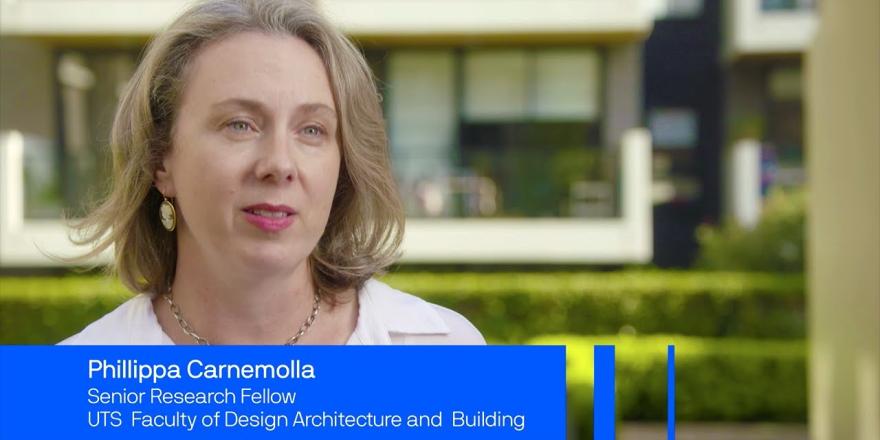The Faculty of Design, Architecture and Building is an innovative, vibrant faculty with a practice-based orientation and a strong focus on industry engagement
Over 30 years our schools have exemplified the best professional education across the design and built environment disciplines, with outcomes spanning traditional exploratory research, industry-focused problem-solving, and creative practice and studio investigations. Core to these diverse disciplines is a commitment to fostering a more just and resilient future, directly shaped and influenced by the research being undertaken by our staff.
Research and teaching are integrated across the faculty, so that students are engaged with both academic leaders and industry practitioners.

my name is philippa carnemolla i'm a
senior research fellow in the faculty of
design architecture and building at the
university of technology sydney and my
expertise is really in examining how the
built environment impacts the
experiences of people particularly
people with disability and older people
who are receiving community care so i
investigate the impact of inclusive
housing and that is the design of the
housing the location of the housing and
how it influences people's independence
autonomy and their community
participation
australia is a large not-for-profit and
our passion is social inclusion for
people with disability we worked with a
developer to build this beautiful set of
apartments
where the whole idea is that it actually
enables people with disability to be
included in a regular community one of
the most important things about this
project is that it enables us to capture
the experiences of people with
intellectual disability from their
perspective how do they experience the
built environment the houses where they
live the communities where they live
i'm here to see lucy lucy lives at
crowler state and she is a participant
in the research that i'm doing on
supported accommodation and finding out
people's experiences of living in their
own apartment and receiving support
[Music]
i had the opportunity to meet over 25
people who live here and who received
support and in particular we'd do some
tours of people's apartments and they'd
speak about the design what they did
what they enjoyed doing what they don't
like about aspects within the built
environment how long have you lived here
for i'm maybe about
i've been living here about four weeks
and a half
what are some of the things you love
about living
a dog oh yeah the dogs are there any
cafes you'd like to go to i really like
the color or the cafe and what do you
have
now
it's about capturing the stories people
here and and weaving those stories
together to get a holistic understanding
of what it means to live in your own
apartment and to receive support and how
you can maximise community participation
because what we find is that time and
time again placing people in community
doesn't mean that people feel a part of
that community
it's been incredibly valuable for us to
actually have
information about the areas that we can
improve and we continue to ask those
questions and philippa continues to have
a relationship with the people here and
reflect back to us what their experience
is
traditionally people who live with an
intellectual disability
and receive 24-hour sport have really
only had one choice and that's living in
a group home this model is an
alternative and it's where people live
with one other person or on their own in
their own apartment and still receive
24-hour support without staff sleeping
over in their apartment what i found was
that this totally changed people's sense
of ownership of place this was their
apartment and theirs only it's their
home
we want people to live really good lives
and that's important for us to actually
understand what that means and having an
independent person like philippa as a
researcher come in and help us
understand that has been so critical for
us what i really hope for is that the
research that i'm building that body of
knowledge will contribute to how our
cities are designed so starting from the
spaces where we live and moving out to
our public spaces and even considering
our cities designing for autonomy
independence and quality of life
[Music]
[Music]
Research
At DAB, we have five research focus areas spanning advanced technologies and materials, visualising information, resilient urbanism, and critical design and theory.
Our key areas of research strength cover:
- Design agency and designing futures
- Social justice in built environment and society
- Sustainable user behaviour and environmental performance
- Technological and industrial transformation
- Visualisation
The research activity is primarily located within each of the three schools:
Staff in each of these areas work across our five areas of expertise, delivering research of national and international importance and promoting interdisciplinary research.

